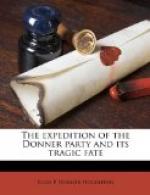The most distinguished had cork stoppers for heads, with faces marked on the sides, the rest, only wads of paper or cloth fastened on the ends of sticks that reached down into the bodies. A strip of cloth tied around each neck, below the bulge, served as make-believe arms, suitable for all ordinary purposes, and, with a little assistance, capable of saluting an officer or waving to a comrade.
We worried because they were clothed in fragments of cloth and paper too thin for the season; and the very first chance we got, we slipped out and found our darlings in a pitiable plight. Generals Washington and Jackson, and little Van Buren were mired at the foot of a land slide from the overhanging bank. Taylor, Webster, Clay, and Benton had been knocked down and buried almost out of sight. Martha Washington’s white shawl and the chicken plumes in her hat were ruined; and Dandy Jim from North Carolina lay at her feet with a broken neck!
Such a shock! Not until we realized that everything could be restored was our grief assuaged—that is, everything but Dandy Jim. He was a serious loss, for he was our only black bottle and had always been kept to wait on Martha Washington.
We worked fast, and had accomplished so much before being called into the house that we might have put everything in order next day, had Georgia not waked up toward morning with a severe cold, and had grandma not found out how she caught it. The outcome was that our treasures were taken to the store-room to become medicine and vinegar bottles, and we mourned like birds robbed of their young.
New duties were opened to me as soon as I could wear my shoes, and by the time Georgia was out again, I was a busy little dairymaid, and quite at home in the corrals. I had been decorated with the regulation salt bag, which hung close to my left side, like a fisherman’s basket. I owned a quart cup and could milk with either hand, also knew how to administer the pinch of salt which each cow expected. After a little practice I became able to do all the “stripping.” In some cases it amounted to not more than half a pint from each animal. However, much or little, the strippings were of importance, and were kept separate, because grandma considered them “good as cream in the cheese kettle.”
When I could sit on the one-legged stool, which Jakie had made me, hold a pail between my knees and milk one or more cows, without help, they both praised my cleverness—a cleverness which fixed more outside responsibilities upon me, and kept me from Georgia a longer while each day. My work was hard, still I remained noticeably taller and stronger than she, who was assigned to lighter household duties. I felt that I had no reason to complain of my tasks, because everybody about me was busy, and the work had to be done.
If I was more helpful than my little sister, I was also a source of greater trouble, for I wore out my clothes faster, and they were difficult to replace, especially shoes.




